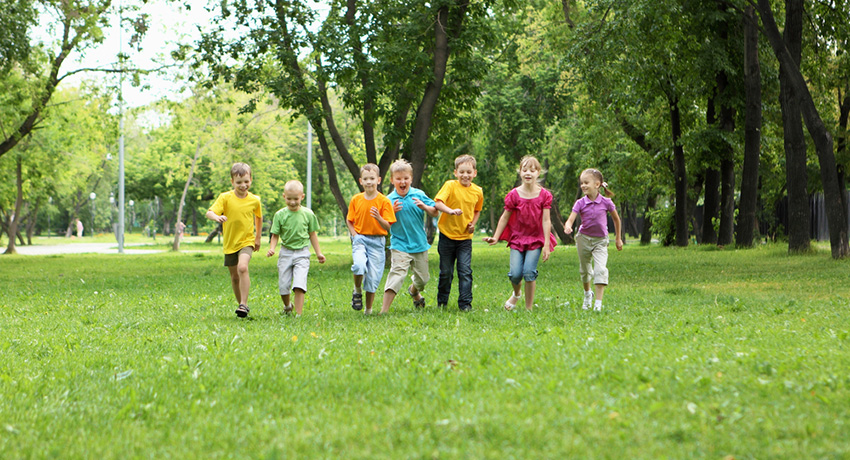
This back-to-school during COVID-19, bolster children’s mental and emotional well-being through play
August 24, 2021Parents, educators and children alike are watching the calendar as the new school year draws closer.
The last school year was spent under COVID-19 lockdowns, restrictions and school closures, resulting in children being subject to a dizzying array of changes. Added to this were disruptions to daily family life, as many parents scrambled to be both teacher and entertainer to children.
We are part of a growing global team of cross-discipline researchers considering how play and children’s lives have been affected during the pandemic. In our pilot research with five neighbourhood families in Eastern Canada, we found that while parents expressed concern about children’s missed school time, the children aged six to 12 were seeking creative ways to reclaim their former pandemic play lives through virtual sleepovers and Zoom neighbourhood ukulele lessons.
As schools return to in-person learning, the joint efforts of school communities and families to make time for play at school and at home will be essential to give children space to work out anxieties carried over from the pandemic, in addition to providing many other social and cognitive benefits.
Play and resilience
Resilience is an important element in childhood development, a reserve of emotional strength a child can draw on for the rest of their lives.
The value of play in developing children’s resilience is well-known. Play is the means by which children experiment and interact with the world. It’s the way they process their classroom and home learning, a vital part of their mental and social development.
The pandemic has highlighted children’s play as a wellspring for creativity, exploration and socialization. But it has also underlined how children experienced the pandemic’s stress and trauma — and how play can help them cope.
Play affected by pandemic
Children and families have watched as the pandemic unravelled the world of school, children’s activities and playgrounds.
Important milestones, such as concerts and graduations were held virtually in socially distanced classrooms. Teachers and parents alike were dismayed at the loss of children’s “red-carpet” moments.
While some education officials might argue that post-pandemic academic recovery should be first priority following gaps in face-to-face education, our concern is that academic recovery should not — and need not — come at the expense of bolstering children’s mental and emotional well-being through play.
Play is also critical in laying the groundwork for academic learning both in terms of children’s socio-emotional regulation as well as for the development of motor skills and conceptual thinking.
Returning to school
We heard from parents who participated in our research that online schooling gave them a new window into the challenges of teaching.
One parent said they worried that their child wouldn’t stay focused, but the teacher tried very hard, having the kids do scavenger hunts for objects from the book they were reading, or timed exercises to give their bodies a break.
Such attention to children’s rhythms and needs will need to continue as they return to in-person learning.
Unfortunately, continuing COVID-19 protocols and practices in children’s environments will restrict play. This will necessitate using creative strategies to address how children can play freely and socially during school and have venues to communicate and express their feelings.
It will be important to continue to talk with children about the important roles they play in helping to keep themselves and others safe, such as through handwashing. Open communication and play, especially when these happen in dialogue with each other, will be vital as children return to school and play with friends.
Communicate, give kids clear facts
Tracy Rose, director of the Memorial University Childcare Centre, said:
Many teachers understood at the height of the pandemic that balancing their own fears against children’s needs would be critical. One teacher relayed to us that she read the book Why Did the Whole World Stop? Talking with Kids about COVID-19 just before children left for an extended lockdown:
Children are adept at taking understandable facts, and transferring them into play spaces to wrestle with their meanings. This gives children some of the crucial tools they need to interpret stressful times and build resilience.
We have already seen how children are playing out their COVID-19 experiences in classrooms — for example, kindergarteners pretending to give vaccines. Even if parents and teachers don’t always include children in discussions about the pandemic, children are still listening and learning through play.
Collaborating about importance of play
Understanding and promoting children’s play during COVID-19 requires global collaboration and knowledge exchange among researchers, educators and policy-makers.
We believe our global research efforts can help advance our society’s understanding about the role of play in supporting resilience, renewal and recovery in diverse contexts and cultures. This knowledge can better mitigate many negative societal effects experienced by children and families during moments of crises like the pandemic. It can also further amplify the often-unheard voices of children.
Recovering lost ground
Despite the trials of the past year, children will thrive if play offers them opportunities to foster resiliency and emotional health.
Play develops children’s resiliency — their best defence mechanism during times of stress, confusion and crisis. As we move beyond COVID-19, opportunities to play will be paramount to recovering lost ground in a changed world.
This article was originally posted on This back-to-school during COVID-19, bolster children’s mental and emotional well-being through play


